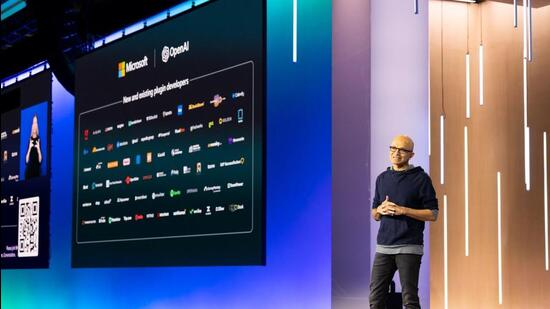As the summer of tech developer conferences continues, the latest chapter written by Microsoft, artificial intelligence (AI) continues to be in focus. There was no ambiguity as the Microsoft Build began with the keynote that detailed AI tools for the Windows computing devices, Bing’s integration with OpenAI’s ChatGPT, the next big updates for Edge browser and even an India reference at the conference, with a chatbot developed to bring information about government services on users’ smartphones.
During the keynote, Satya Nadella, executive chairman and CEO of Microsoft, even joked about the volume of official communication the company has sent about AI, in the past few months. Such as been Microsoft’s focus on AI, including the public release of the Bing AI chatbot and Bing Image Creator, in this time.
“So how we build software is radically different, but what we are going to build as developers is really the story of this developer conference, and what we’ve built, we’ve been – you know, it’s not like I came in on January 1st and said, “Let’s start doing press releases,” but it does feel like that. It does feel like we’re – every week there is something new and, you know, infusing this new AI stack across all layers of it, right?” he said.
Copilot is here; move to Cortana
If you remember the Cortana virtual assistant that figured in the Windows’ scheme of things till not too recently, some of this may sound familiar. Microsoft is adding an AI assistant to Windows 11, called Microsoft 365 Copilot. This will build on the Bing Chat, the AI chatbot, and the company says the spectrum of capabilities will include providing personalized answers and navigate within Windows 11, including changing a setting, playing a specific playlist, or opening a relevant app.
The Copilot for Windows 11 isn’t going to be available immediately, with the first public and developer preview versions expected in the coming months. At present, Microsoft 365 Copilot is limited to a private preview. In due course, there will be wider availability across Microsoft’s apps and services, including the Edge web browser sidebar and the Office apps.
Microsoft says the Copilot will also be able to summarise content you may be reading on any app, which may be quite useful with web pages, documents and email attachments. This may be another pleasant memory from the past – think of it as Clippy the helper from earlier Office versions, except much smarter with AI.
To widen the scope, Microsoft is hoping that the adoption of the same open plugin standard which OpenAI introduced for ChatGPT plugins, will help bolt more capabilities to Copilot. Developers can now use one platform to build plugins that work across both consumer and business surfaces, including ChatGPT, Bing, Dynamics 365 Copilot and Microsoft 365 Copilot, Microsoft confirms.
“In fact, the other thing that we’re going to do is have common extensibility across all of these services. Whether it is ChatGPT, Bing Chat, Microsoft 365 Copilot or all of the Microsoft Copilots, and of course, with your own copilots, we can share the same extensibility model,” says Nadella. “This is one of the most powerful things for your developers, for every developer to be able to write a plugin and have it reach billions of users across all of these surface areas,” he added, for developers.
Bing search is now default for ChatGPT chatbot
OpenAI will now have access to Microsoft’s Bing search engine as the default search experience within the ChatGPT chatbot. “Now, ChatGPT answers can be grounded by search and web data and include citations so you can learn more—all directly from within chat,” says Yusuf Mehdi, Corporate Vice President of the Modern Life and Devices Group at Microsoft,
The fine print here is, this additional capability will be available initially to ChatGPT Plus subscribers, with a plugin for free users arriving later. This is, in a way, the progression of Microsoft’s partnership with OpenAI, which sees the latter’s GPT-4 as the foundation for the Bing AI chatbot.
A made in India chatbot
During the keynote, Nadella touched upon the need for technology to make a broader impact, for people. Microsoft Research is working in collaboration with the government backed AI4Bharat, an open-source language AI center based at the Indian Institute of Technology Madras in Chennai and OpenNyAI, to develop the Jugalbandi chatbot.
“We don’t build just because we want economic growth. We want economic growth so that we can have human development index growth. We want the lifespans to go up. We want education and prosperity and standard of living to go up everywhere,” he said, before adding, “It’s not for technology’s sake, but it is for that broad impact.”
This is a new generative AI-driven chatbot on mobile devices, which puts government assistance tools at the fingertips of mobile users. This chatbot currently understands 10 Indian languages and since it is integrated within the WhatsApp app, makes it easy to access. The underlying tech is OpenAI’s ChatGPT, overlayed by Indian language translation models.
“While the Jugalbandi chatbot is still new, it could one day offer all Indians easy access to information in local language through a mobile phone, instead of having to head to the local community service center and stand in line just to get basic information,” Microsoft says. This chatbot was first demo-ed at the Agami Summit 2022, and currently presents information about more than 171 government programs.

